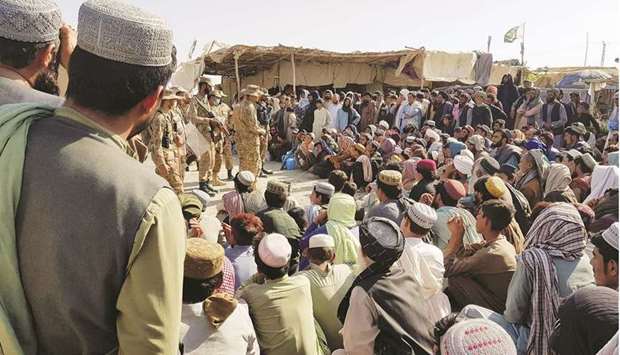Prime Minister Imran Khan accused the United States of seeing his country as “useful” only in the context of the “mess” it is leaving behind in Afghanistan after 20 years of fighting.
Washington has been pressing Pakistan to use its influence over the Taliban to broker an elusive peace deal as negotiations between the insurgents and Afghan government have stalled, and violence in Afghanistan has escalated sharply.
“Pakistan is just considered only to be useful in the context of somehow settling this mess, which has been left behind after 20 years of trying to find a military solution when there was not one,” Khan told foreign journalists at his home in Islamabad.
The United States will pull out its military by August 31, 20 years after toppling the Taliban government in 2001.
But, as the United States leaves, the Taliban today controls more territory than at any point since then.
Kabul and several Western governments say Pakistan’s support for the insurgent group allowed it to weather the war.
The charge of supporting the Taliban despite being a US ally has long been a sore point between Washington and Islamabad.
Pakistan denies supporting the Taliban.
Prime Minister Khan said that Islamabad is not taking sides in Afghanistan.
“I think that the Americans have decided that India is their strategic partner now, and I think that’s why there’s a different way of treating Pakistan now,” Khan said.
Pakistan and India are archrivals and have fought three wars.
The two share frosty ties and currently have minimal diplomatic relations.
A political settlement in Afghanistan was looking difficult under current conditions, Khan added.
He said he tried to persuade Taliban leaders when they were visiting Pakistan to reach a settlement.
“The condition is that as long as Ashraf Ghani is there, ‘we (Taliban) are not going to talk to the Afghan government’,” Khan said, quoting the Taliban leaders as telling him.
Peace talks between the Taliban, who view Ghani and his government as US puppets, and a team of Kabul-nominated Afghan negotiators started last September but have made no substantive progress.
Representatives of a number of countries, including the United States, are currently in Doha talking to both sides in a last-ditch push for a ceasefire.
US forces have continued to use air strikes to support Afghan forces against the Taliban, but it remains unclear if such support will continue after August 31.
Khan said Pakistan had “made it very clear” that it does not want any American military bases in Pakistan after US forces exit Afghanistan.
Pakistani forces meanwhile clashed with hundreds of Afghans stranded on Pakistan’s side of a commercially-vital border crossing with Afghanistan after its closure by Taliban insurgents, Pakistani security officials said.
The disturbances broke out yesterday after a 56-year-old Afghan died of a heart attack as he waited in the dusty heat to enter Afghanistan via the Chaman-Spin Boldak crossing, Arif Kakar, a Pakistani official on the scene, told Reuters.
Protesters carried his body to a local Pakistani government office, demanding the border be reopened.
Some began throwing stones at security forces, who responded by firing tear gas and charging the protesters with batons to disperse them.
No injuries were reported.
The Chaman-Spin Boldak crossing is landlocked Afghanistan’s second busiest entry point and main commercial artery to the Pakistani seacoast.
The Taliban, who captured the crossing last month as part of a major advance across Afghanistan as US-led foreign forces withdraw, announced its closure on August 6 in protest at a Pakistani decision to end visa-free travel for Afghans.
The Taliban are demanding Pakistan allow Afghans to cross the frontier with either an Afghan ID card or a Pakistani-issued refugee registration card.
Some 900 trucks went through the Chaman-Spin Boldak crossing daily before the Taliban seized it.

Prime Minister Khan: Pakistan had made it very clear that it does not want any American military bases in Pakistan after US forces exit Afghanistan.

